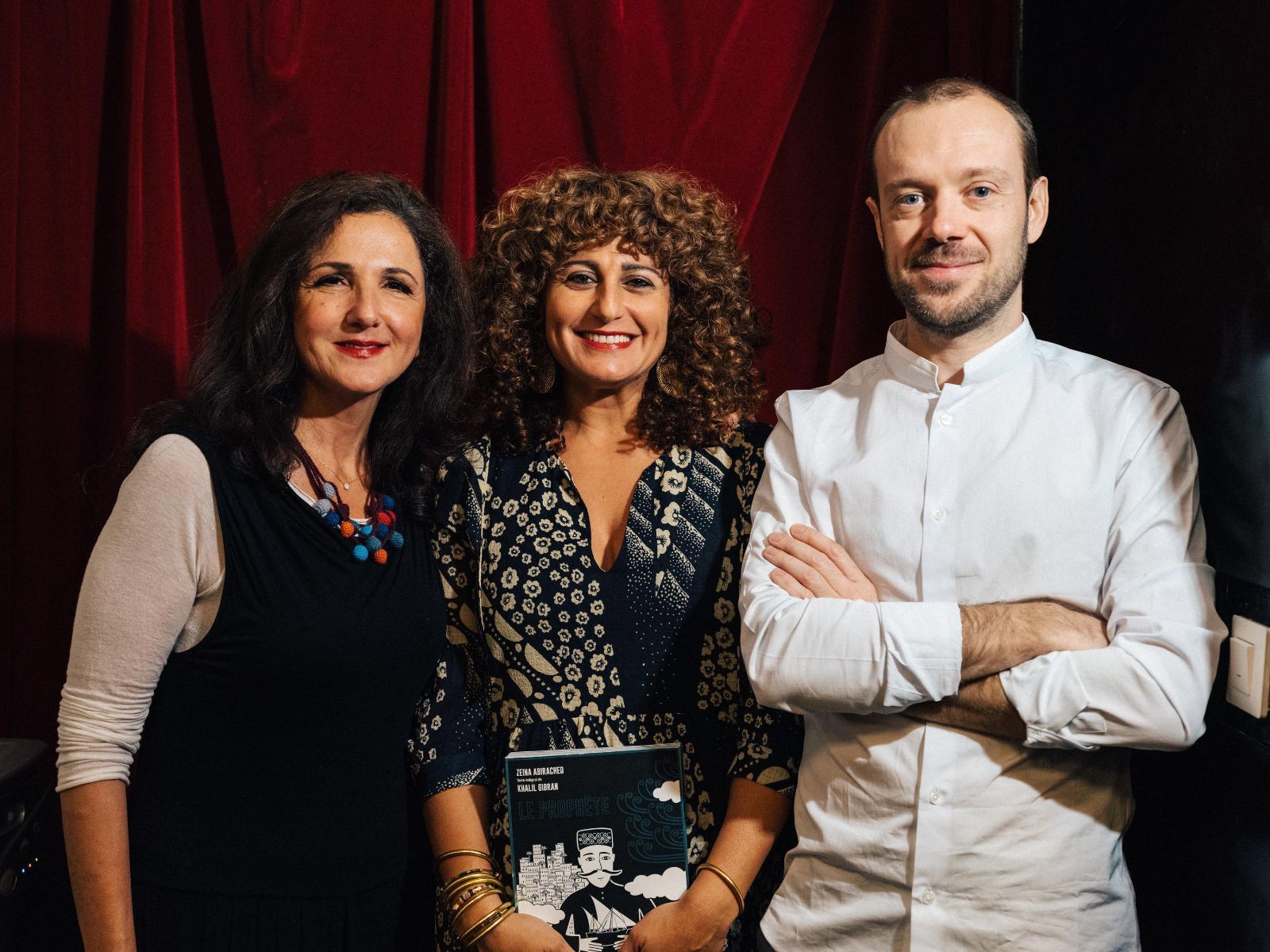
On November 22, 2024, at 8:30 p.m., the Déméter Hall at La Criée in Marseille hosted a unique evening combining musical reading and visual art. Zeina Abirached revisited The Prophet by Khalil Gibran, accompanied by singer-performer Tania Saleh and musician Guillaume Retail.
More than 800 attendees gathered at La Criée for an extraordinary evening of art and storytelling. The event combined the power of Khalil Gibran’s The Prophet with the evocative visuals of Zeina Abirached, whose black-and-white illustrations were projected on stage. The performance was enriched by the soulful voice of Tania Saleh and the musical accompaniment of Guillaume Retail. This unique collaboration illuminated Gibran’s universal messages and underscored the transformative power of art in today’s rapidly changing world.
Zeina Abirached and the Gibran Project
The project originated with Seghers Editions, which aimed to celebrate the centennial of The Prophet, first published in 1923, through a fully illustrated edition. Zeina Abirached, chosen to undertake this artistic challenge, embraced the opportunity wholeheartedly. “This text, undoubtedly Khalil Gibran’s most famous work, deeply resonates with the Lebanese diaspora, but it also holds personal significance for me. I had never truly read it before embarking on this project. It became a profound encounter,” she explained.
Working from Didier Sénécal’s French translation, which she describes as “an ideal version to incorporate a second language, that of drawing,” her inspiration came quickly. “As soon as I started reading, images appeared to me. They quickly took shape on paper,” she said, emphasizing the natural connection between Gibran’s words and her visual interpretations.
The introduction to The Prophet particularly moved her. “The story begins precisely as Al-Mustafa, the prophet, sees the ship arriving to take him back to his homeland after twelve years of waiting. Instead of rushing to the dock, he hesitates, struck by a certain slowness. That moment deeply touched me because it mirrors the complexity of exile and return—themes that resonate strongly with the Lebanese experience,” she noted.
For Zeina Abirached, The Prophet captures the essence of departures and returns without explicitly naming exile, while still being steeped in its universal theme. “This intimate connection to exile, the choice of whether to leave or stay, profoundly impacted me and gave my work deeper meaning,” she said. Her use of black-and-white illustrations reflects her emotional approach. “Black and white offer me a very personal and powerful connection,” she explained, likening it to a “musical score” that brings balance and harmony to her visual creations.
The release of the book on October 12, 2023, shortly after the events of October 7, gave the project even greater resonance. “In a Middle East where barbarity seemed to rage, this text—carrying wisdom, poetry, and peace—felt like a refuge,” she observed.
The performance of The Prophet was designed as an artistic dialogue, bridging languages, disciplines, and cultures. “Faced with the urgency of today’s world, I wanted not only to project the images onstage but also to make the Arabic language heard. Naturally, the first reading, in both French and Arabic, took place in Lebanon during the latest book festival organized by the French Institute. It was held at Le Monnot Theater, where I invited several Lebanese authors to participate. That was the starting point,” she recalled.
Adapting the performance to Marseille, a city renowned as a Mediterranean hub and cultural melting pot, amplified its impact. “This bilingual reading, supported by my black-and-white illustrations, carried even more weight in such a poignant context,” concluded Zeina Abirached.
Tania Saleh and the Musical Dimension
Tania Saleh, deeply touched by the collaboration, shared her thoughts on the importance of art amid today’s challenges. “Art is an escape—a way to step away from screens, phones, and distressing news. Music, nature, dance, theater, and poetry allow us to keep dreaming and to find a reason to live,” she said. She emphasized the need to preserve the authenticity of human creativity: “I’m not against technology as a tool, but it’s crucial that art remains a human creation, untouched by machines.”
The project stemmed from a shared admiration between the two artists. “Zeina Abirached asked me to read excerpts from The Prophet in Arabic, then invited me to sing a piece inspired by Gibran. I immediately accepted because I deeply admire her work, which is rooted in Lebanese culture yet imbued with a distinctive style,” Tania Saleh explained.
The musical highlight of the evening was an a cappella rendition of Al Mahabba, a song by the Rahbani brothers made famous by Feyrouz. “This collaboration was natural and vibrant, elevating the experience for the audience,” Tania Saleh noted.
Marseille as a Starting Point
Zeina Abirached, a Franco-Lebanese graphic novelist, explores themes of war, fear, and resilience with remarkable sensitivity and creativity in her work. Born in Beirut in 1981, she recounts her childhood shaped by Lebanon’s civil war and the region’s ongoing tragedies, blending humor and poetry to soften the darkness. Through works like Mourir Partir Revenir and Je Me Souviens (Beyrouth), she crafts narratives that are both deeply personal and universal.
Today, she continues to share messages of hope while honoring Khalil Gibran’s words and pursuing artistic endeavors that transform hardship into beauty. This evening at La Criée marked a turning point for the artist, who has since received invitations to bring this performance to other countries. The success of her book, which combines depth and universality, underscores the enduring impact of her artistic vision.




Comments